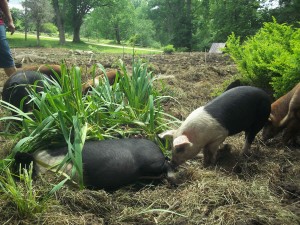“The Maserati of Pork”: Farmer Takes Roger Williams Students for an Emotional Drive
- by Sea Sloat
Americans spend less of their income on food per capita than any other country in the world. Along with water and air, food is what sustains us — yet we’ve lost sight of its true value.
As a Bon Appétit Fellow, giving kitchen tours is one way I share with students the last important step in the food chain that brings our sustainability politics to their plate. When I organized a kitchen tour for students at Roger Williams University, I had no idea we were also in for an eye-opening lesson in food philosophy.
Farm to Fork partner Pat Beck of New England Grass Fed happened to stop by, and he challenged the students to re-think the gift of meat.
“To take this gift is something that some people don’t do with any sense of gratitude.”
—Pat Beck, New England Grass Fed
As you might guess from the name, New England Grass Fed raises 100% grass-fed beef, pastured pork, and rotationally grazed rabbit on pasture, focusing on hardy heritage breeds that thrive on free-range grazing and develop deep powerful flavor. Pat contracts with a number of family farms in the region for animals and grazing rights on high-diversity pasture. He’d dropped in to see if the Bon Appétit team wanted to buy some particularly beautiful cuts of pork from one of his producer-partners.
In an impromptu soliloquy, he shared with the students his passion for what he calls “the Maserati of pork” — a dark cut of belly that you’ll only get from a well-respected, pasture-raised animal. The unparalleled quality of the meat, along with Pat’s deep appreciation for the gift of the animal’s life, makes this pork an undoubtedly superior product.
I happened to start recording. Hear for yourself what Pat and Chef de Cuisine Jon Cambra had to say to the students:

Pastured pigs
Pat shared some more information about the prized animal that demonstrates just how much he appreciates his protein: “The pork is from a Large Black from Nordland Farm in Foster, RI. This is a great old heritage breed that is an excellent grazer and a good mother,” said Pat. (Maternal qualities have long been bred out of industrialized sows, but they are particularly important in pasture operations, which don’t rely on inhumane practices such as gestation crates.) “It has incredible flavor from rooting for grubs and eating all that dirt. Flavor is almost completely absent from commercial pork — a shameful product supported by pharmaceutical input that stresses these noble beasts. They deserve better than the methods that keep meat prices artificially low. These guys [farmers] are out on the land raised with respect, and you can taste the difference.”
Added Jon: “Guys like Pat and others who are doing this throughout the country are bringing back what the animal was raised for, and if we do choose to eat animals, we should be doing so for the right reasons, not just because we want pork chops every day.”
The Roger Williams students walked away with the challenge of changing how they eat, and I walked away reinvigorated about working for a company that supports the kind of partnership I witnessed in the kitchen that day.
Meat isn’t to be gobbled up by the pound daily, it should be appreciated and treated with respect, like a luxury Italian sports car.